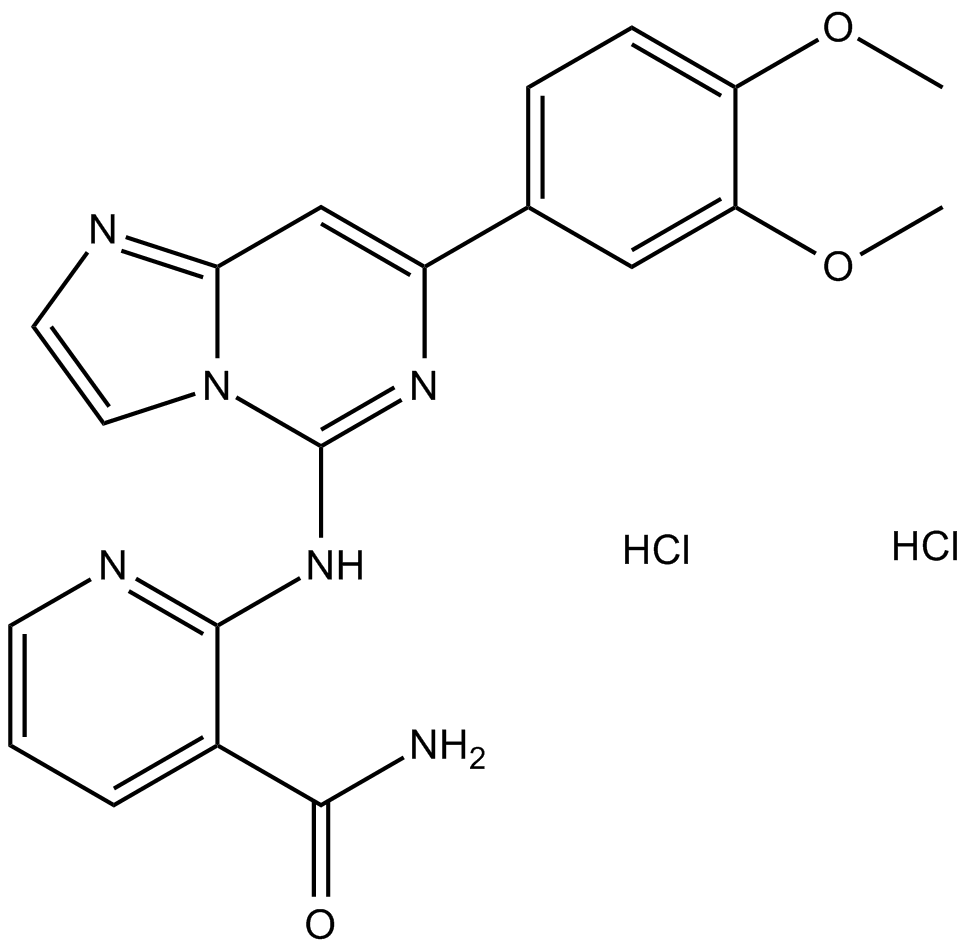BAY 61-3606 dihydrochloride (Synonyms: BAY61-3606 dihydrochloride;BAY 61-3606) |
| Catalog No.GC12136 |
Products are for research use only. Not for human use. We do not sell to patients.

Cas No.: 648903-57-5
Sample solution is provided at 25 µL, 10mM.
BAY 61-3606 dihydrochloride is an orally available, ATP-competitive, reversible and highly selective Syk inhibitor with a Ki of 7.5 nM an IC50 of 10 nM[1]. BAY 61-3606 dihydrochloride reduces ERK1/2 and Akt phosphorylation in neuroblastoma cell[2]. BAY 61-3606 dihydrochloride induces a large decrease of Syk phosphorylation in K-rn cell lysates[3]. Bay 61-3606 dihydrochloride sensitizes TRAIL-induced apoptosis by downregulating Mcl-1 in breast cancer cells[4].
BAY 61-3606 (0.01-10 μM ; 48 hours) significantly reduces the cell viability of SYK-positive SH-SY5Y and SYK-negative SK-N-BE cells in a dose-dependent matter. SH-SY5Y cells expressing high SYK levels are significantly more sensitive to BAY 61-3606 in comparison to SK-N-BEcells expressing very low or no SYK[2]. BAY 61-3606 (0.4 and 0.8 μM; 4 or 24 hours) inhibits SYK activity by reducing ERK1/2 and Akt phosphorylation in neuroblastoma cell SH-SY5Y[2].BAY 61-3606 (2 μM; 2 hours) induces a large decrease of Syk phosphorylation in K-rn cell lysates[3].
Bay 61-3606 (50 mg/kg; administered twice a week for two weeks by intraperitoneal injection) alone leads to more efficacious reductions than that of TNF-related apoptosis-inducing ligand (TRAIL; 10 mg/kg) alone in MCF-7 tumor xenograft-bearing BALB/c nude mice. Bay 61-3606 administered in TRAIL combination significantly reduces the volume of the xenografted tumor[4].
References:
[1]. Yamamoto N, et al. The orally available spleen tyrosine kinase inhibitor 2-[7-(3,4-dimethoxyphenyl)-imidazo[1,2-c]pyrimidin-5-ylamino]nicotinamide dihydrochloride (BAY 61-3606) blocks antigen-induced airway inflammation in rodents. J Pharmacol Exp Ther. 2003 Sep;306(3):1174-81.
[2]. Tümmler C, et al. SYK Inhibition Potentiates the Effect of Chemotherapeutic Drugs on Neuroblastoma Cells in Vitro. Cancers (Basel). 2019 Feb 10;11(2). pii: E202.
[3]. Gioia R, et al. Quantitative phosphoproteomics revealed interplay between Syk and Lyn in the resistance to AMN107 in chronic myeloid leukemia cells. Blood. 2011 Aug 25;118(8):2211-21.
[4]. Kim SY, et al. Bay 61-3606 Sensitizes TRAIL-Induced Apoptosis by Downregulating Mcl-1 in Breast Cancer Cells. PLoS One. 2015 Dec 31;10(12):e0146073.
Average Rating: 5 (Based on Reviews and 30 reference(s) in Google Scholar.)
GLPBIO products are for RESEARCH USE ONLY. Please make sure your review or question is research based.
Required fields are marked with *




















